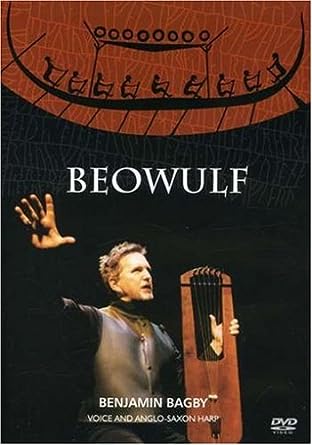
When Benjamin Bagby is on stage, he tells a story nearly everyone knows, in a language no one understands - and the audience is mesmerized. His performance of Beowulf, in Old English, is creative, disciplined, entertaining, inspiring... in short, theater of the first magnitude. Bagby exploits the entire range of vocal sound, form, and technique: he growls, yells, sings, whispers, chants, as required. Through a thorough education to the oral tradition and a meticulous analysis of the text, he animates each phrase with commitment to his specific aesthetic decision. When he barks out the first word, "Hwaet!" (Listen!), we hear the voice of the bard across a thousand years.
The translation into modern English is projected on two screens at either side of the performer. We refer to this regularly, but we're not attached to it. When we hear a word we recognize—the word for “welcome” or “God” or “drunk”—we experience a rush of recognition. But it's thrilling that we don't know the denotative meaning of what we hear. It exposes the musicality of language, and we realize the rich, expressive potential of the human voice. Bagby accompanies himself on a lyre modeled after one excavated from a seventh century grave, hollow, but with no soundhole, and with six strings. It's a marvelous scene partner, sometimes played between lines, sometimes on the line, and given myriad personalities. Its tones match the voice; Bagby might pitch his voice lower than its range, but never higher. Beowulf was created some time between the sixth and the eleventh century, when it was finally written down. Bagby tells us flatly that it is not literature; it's an oral piece. The entire performance of the epic poem would last from four to seven hours; Bagby offers us about a quarter of it, the first of three sections. The story, you'll recall, concerns a hero, Beowulf, who travels to Denmark to slay Grendel, the descendant of Cain, the monster who's been terrorizing the hall of King Hrothgar and gobbling up his men. In a wonderful discussion with the audience after his performance, Bagby stresses the importance of the piece in affirming our sense of community. What great fortune to have an artist like this! In a generation jaded by overproduced staging and deafened by over-amplified electronics, his work is primal and mysterious. Hwaet!
